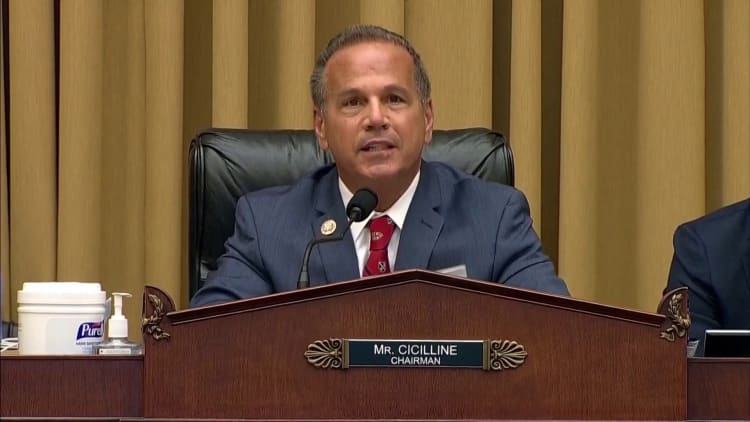As the U.S. passed 150,000 deaths from the coronavirus pandemic and with millions of Americans facing eviction from their homes and an imminent drop in their unemployment benefits, Congress on Wednesday turned its attention to a very different subject: Whether big tech companies are too powerful.
For more than six hours, members of the House Antitrust Subcommittee grilled the CEOs of Alphabet, Amazon, Apple and Facebook -- four of the country's five most valuable companies, with only Microsoft missing -- on a wide range of matters. The CEOs dialed in through videoconference, while most of the committee members were present in Congress, where Chairman David Cicilline, D-R.I., repeatedly reminded them to wear masks to prevent the spread of Covid-19.
For a full recap, check out CNBC's live blog of the event here.
While the topic was ostensibly antitrust and anti-competitive behavior, several Republican members of the committee attacked Facebook for allegedly suppressing conservative voices, despite the fact that -- as Rep. Jamie Raskin, D.-Md., pointed out -- the most popular posts on the site consistently come from right-leaning outfits such as Ben Shapiro, Franklin Graham, and Breitbart.
Other members of the subcommittee seemed unprepared with details. One notable exception was Rep. Pramila Jayapal, D-Wash., who pressed Facebook's Mark Zuckerberg on whether he'd ever threatened to clone a company he was trying to acquire, and Amazon's Jeff Bezos on how the company uses data from third-party sellers to inform its own product creation. For the most part, the committee members used their time to make speeches and accusations, and frequently interrupted the witnesses before they had a chance to finish answering their questions.
Overall, Zuckerberg and Alphabet's Sundar Pichai received the most questions, while Apple's Tim Cook received the least. Here's a rundown by company:
Alphabet CEO Sundar Pichai
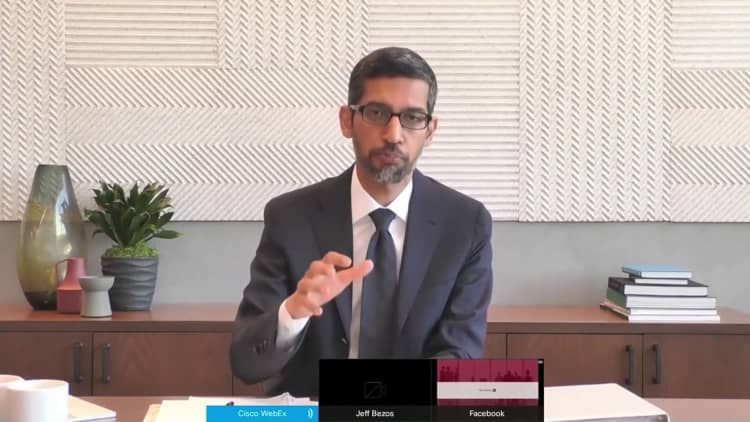
Pichai, who testified in front of a textured white wall and dark wooden cabinet decorated with knick-knacks, faced persistent questioning about the company's core search business, including whether it stole content from other web sites -- an accusation leveled by local-business listings site Yelp, among others, in the past -- and why it increasingly is guiding users to its own results rather than third-party web sites.
Rep Ken Buck, R.-Colo., also pressed Pichai on the company's decision to drop out of bidding for a $10 billion Defense Department cloud computing project while pursuing other opportunities in China. Pichai answered by describing how it partners with U.S. agencies and was adamant about not serving customers in China in the present day with the exception of a small number of projects.
Facebook CEO Mark Zuckerberg
Zuckerberg, appearing in front of a white wood-paneled wall, faced a barrage of questions about the company's acquisitions of Instagram and WhatsApp, which some members of Congress said were anti-competitive and should be revisited, or forcibly spun out.
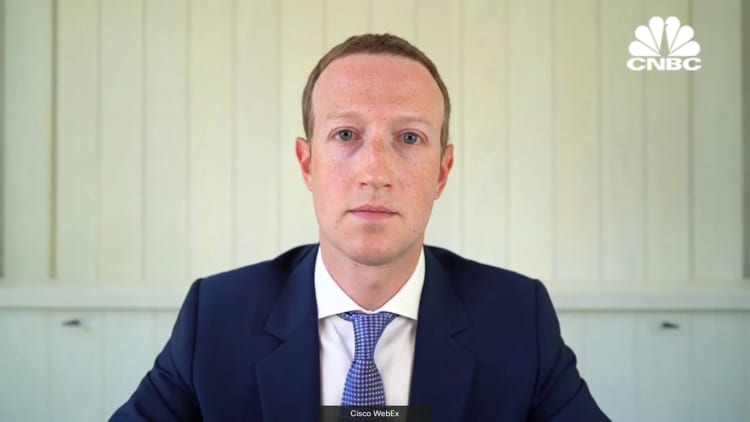
In particular, Rep. Jaypal cited documents that showed Instagram founder Kevin Systrom was afraid Facebook would go into "destroy mode" and build a clone of Instagram if the start-up didn't agree to an acquisition. Rep. Jerrold Nadler, D.-N.Y., accused the company of buying Instagram because it saw it "as a powerful threat that could siphon business away from Facebook" and said, "this is exactly the type of anti-competitive acquisition that antitrust laws were designed to prevent." Zuckerberg acknowledged it viewed Instagram as a competitor when it bought the company in 2012, but said that it was far from a given that the picture-sharing app would reach the kind of scale it did with Facebook's help.
Chairman Cicilline, in another line of questioning, accused Facebook of being too slow to remove misinformation about Covid-19, and said that the company's size makes it difficult to police content.
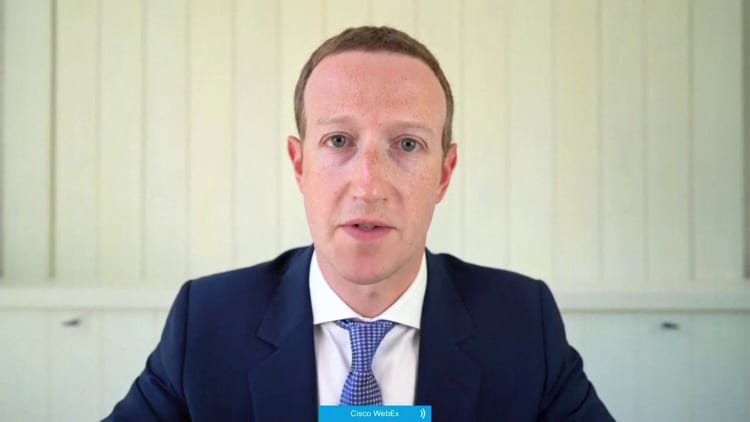
Amazon CEO Jeff Bezos
Bezos, who delivered his testimony in front of a bookshelf filled with items including a gold sculpture of three overlapping circles, seemed to be the best-prepared among the four CEOs, and strove to complete his answers even as the congressmembers interrupted him.
Their lines of questioning mostly revolved around how Amazon uses data from customer behavior to compete against third-party sellers who market their products through the Amazon Marketplace.
"You can set the rules of the game for your competitors but not actually follow those same rules for yourself," Rep. Jayapal said. "Do you think that's fair to the third-party businesses that sell on your platform?"
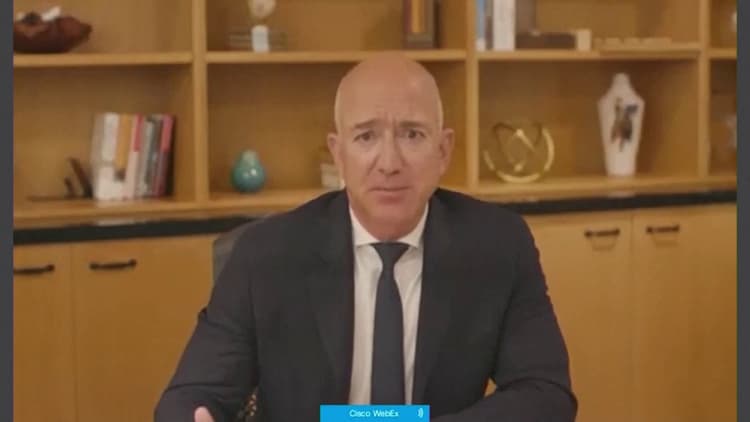
Bezos said the company is investigating a Wall Street Journal report that called attention to the practice, and that the company would "take action" against employees who violated internal policies around using customer data.
Bezos also appeared surprised at an audio recording from an Amazon Marketplace vendor who said the company removed her from its platform without explanation, and said he did not believe there was a systemic problem with how the company treats its marketplace vendors.
Apple CEO Tim Cook
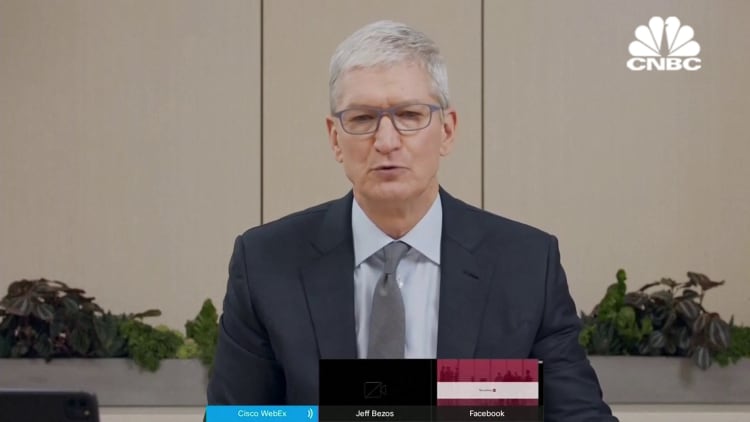
Cook, who spoke from in front of what appeared to be a blank office partition, faced questioning about Apple's policies toward app developers who sell apps through the App Store. Third-party developers have accused the company of being inconsistent in how it treats them, and Rep. Hank Johnson, D-Ga., dug in on the issue, asking if Apple cut a special deal with Amazon to take lower fees, and whether it offered a Chinese search engine extra help navigating the rules. Cook said that the lower rates are available to any developer meeting the conditions, but demurred on the Baidu question.
Cook also defended Apple's policy of taking a 30% cut of transactions conducted through apps downloaded via the App Store, saying that the commissions were similar or lower than other digital platforms, and that customers who think they're getting a raw deal can always turn to Android phones.
"If you're a customer, and you don't like the setup, the curated experience of the App Store, you can buy a Samsung," he said.
The takeaway: Long slog ahead
Investors seemed completely unconcerned over today's hearings, sending all four companies' stocks up slightly during trading hours.
Indeed, today's hearing was unfocused and rambling, which was somewhat expected given the very different nature of the four companies and the claims against them. Sure, they're all big, but they compete in different markets with different business models.
For example, Apple has far from dominant share in the smartphone market, and the main argument is that it exercises too much control over the third-party apps it allows to run on the iPhone, which could lead to higher prices and lower selection. In contrast, Google unquestionably has dominant market share in search, but it's hard to prove consumer harm given that its product is free.
Nonetheless, investors and the companies themselves should be aware that today's hearings likely represent the beginning, rather than the culmination, of a wide range of legal actions against them. Future hearings are likely to be more focused, and government agencies like the Department of Justice and Federal Trade Commission can subpoena documents and force executives to testify under oath again and again.
As Microsoft learned in the 1990s and 2000s, antitrust regulation can be a drag on innovation and earnings for years. One day of bright lights in front of a congressional subcommittee is a small, sour taste of what could come next.
WATCH: Rep. Cicilline says these companies have monopoly power
